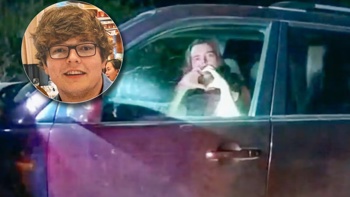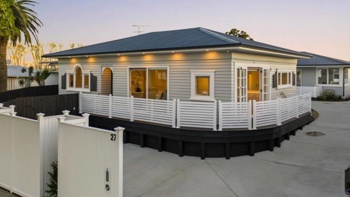
A local MP is urging the Government to do an urgent “stocktake” of how many gang members are in Rotorua emergency housing after three government departments and agencies were not able to report the number.
The information arose out of a series of parliamentary written questions submitted to ministers by Rotorua MP Todd McClay, supplied to Local Democracy Reporting.
Rotorua mayor Tania Tapsell says she welcomes reassurance that government agencies “know who is going into Rotorua motels” and are minimising the risk of harm.
The Ministry of Social Development (MSD) says it takes safety seriously and keeps in “regular contact” with moteliers and agencies such as the police, and provides housing assistance to anyone who needs help, including gang members.
On July 1, McClay asked Police Minister Chris Hipkins if police were informed of how many gang-affiliated people lived in contracted emergency housing motels in Rotorua.
Hipkins replied there was an “understanding” between support services, MSD and relevant Government agencies and they advised the police about known gang members in motels, though said that had not occurred to date.
On July 28, McClay asked if police had a record of how many people on the national gang list were living in Rotorua emergency housing motels.
/cloudfront-ap-southeast-2.images.arcpublishing.com/nzme/NACUZMGU4ZUDX7UP5Q6HSMLNSA.jpg)
Police Minister Chris Hipkins said police did not know how many gang members were living in Rotorua emergency housing. Photo / Mark Mitchell
Hipkins replied police did not hold that data as it would require MSD to regularly update police or the gang intelligence centre on the addresses of all emergency housingand the names of those at each address - information that could change daily.
McClay also asked, on June 9, how many police callouts there had been to motels in Rotorua in the three months prior and how many of those were gang-related.
Hipkins replied police did not record whether a call-out was to an emergency housing motel as they were categorised as residential addresses.
He said the answer could not be provided as it was not readily available, would require considerable effort to compile and it was not in the public interest to obtain it.
McClay also asked several questions about the number of arrests at 14 motelsused for emergency housing every year since 2016 but Hipkins said the police did not break data down to that level as it could breach the privacy of individuals - in particular, victims of crime - or harm commercial interests.
McClay also asked Social Development Minister Carmel Sepuloni how many gang members were living in contracted emergency housing motels. She replied gang membership information was “not centrally recorded” by MSD and to procure the information would require a manual search of all client records, the time and expense of which she did not consider in the public interest.
Housing Minister Megan Woods was asked whether the Ministry of Housing and Urban Development (MHUD) was informed of the number of gang-affiliated people living in MHUD-contracted emergency housing motels.
The answer was no.
McClay told Local Democracy Reporting he believed it was concerning “nobody knows what’s going on” with gangs and crime in the motels.
In McClay’s view, the Government was “making excuses and letting down Rotorua” and he called on ministers to do an urgent “stocktake” and answer all of the questions he had asked.
He said it was important for the town, its reputation and public safety.
/cloudfront-ap-southeast-2.images.arcpublishing.com/nzme/XSIN4G6NPRCR5JSWVCG625Y7KE.jpg)
Rotorua MP Todd McClay is asking the Government for answers about emergency housing in the city. Photo / Andrew Warner
“The Government has said it’s too hard and we will not ask for the information to answer these questions. It’s not good enough.”
On Tuesday, Tapsell said it was a matter of ensuring a safe place for motel occupants as well as neighbouring residents.
“It would be good to have reassurance that Government agencies know who is going into Rotorua motels and are ensuring the few that may be high risk won’t cause harm to others.”
/cloudfront-ap-southeast-2.images.arcpublishing.com/nzme/OBMFLTPM3CVSX4D644SU4PKVTU.jpg)
Rotorua mayor Tania Tapsell wants clarity around who is in emergency housing. Photo / NZME
She said she had asked for “better transparency of information” and hoped to achieve this through the Rotorua Housing Accord.
“We have made significant progress towards finding a solution to the emergency housing issues ... and I look forward to confirming this with [Housing] Minister Megan Woods later this week.”
Evolve spokesman Ryan Gray said housing was a human right for all, including gang members.
He said while Rotorua addressed its housing supply issues, what mattered was that “people feel safe in emergency housing” as well as nearby, and more needed to be done to ensure that.
“Social service agencies ... need to ensure that they are working to keep people safe by putting the right people in the right places with adequate support.“
Gray believed negative rhetoric did nothing to address the main issue, increasing the supply of housing.
/cloudfront-ap-southeast-2.images.arcpublishing.com/nzme/P5XYO6BWGZKFYRHEAHGKYIE6BQ.jpg)
Evolve spokesman Ryan Gray argues that even gang members have a right to housing. Photo / Riley Claxton
MSD housing group general manager Karen Hocking said the ministry was in “regular contact” with moteliers and agencies such as the police to identify issues and respond to problems.
“We ... encourage [motels and clients] to contact us if they experience problems or feel unsafe in their accommodation.”
She said all reports of criminal activity or safety threats were taken seriously and violent or criminal behaviour should be raised with the police.
“We want people in emergency housing to feel safe. Anyone who is not feeling safe should get in touch with us immediately and we will work with them to find alternative accommodation, if available.
“As part of our work with the Rotorua Housing Task Force, the ministry is sharing appropriate information with [the] council on emergency housing motel use.
“Our ongoing work with [the] council, Te Arawa iwi and our partner agencies includes work on an agreed set of objectives to improve the wellbeing of whānau in emergency housing, as well as reducing any impacts on the wider community.”
Hocking said the ministry helped people if they were in urgent need and homeless “regardless of who they are” - including gang members and their families.
She said people applying for emergency housing support were assessed on their eligibility and personal situation, and case managers may ask about gang affiliation, but clients could choose whether or not to disclose it.
If they did, it did not affect their eligibility for emergency accommodation.
“If someone tells us they are affiliated with a particular gang, we may not recommend accommodation where we know associates of a different gang are already guests.”
She said some accommodation providers, which were private businesses, could have rules that the ministry expected people to follow.
”Some providers may not wish to provide accommodation to gang affiliates.”
Local Democracy Reporting is public interest journalism funded by NZ On Air.
Take your Radio, Podcasts and Music with you









